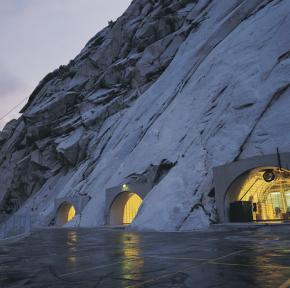Mormon Archive
There is also the Granite Mountain Records Vault in the Salt Lake Valley mountains, which holds genealogical records currently being digitized for public use. Construction of the vault began in 1958 and was generally completed by 1963 and considered completely operational in 1965. The site includes a network of storage rooms containing walls of steel cabinets ten feet high. A separate section houses office spaces, shipping docks and microfilm processing stations. This climate- controlled vault holds 2.4 million rolls of microfilm containing approximately 3.5 billion images. The information links to billions of people in over 100 countries and is recorded in 170 languages. [1] The enormous collection of secured documents includes unpublished records from churches and governments, parish registries, passenger lists, birth certificates, censuses, deeds, wills, family, town and county histories and even maps. Eventually the vast majority of the collection will be available for online research.
- "Such a facility provides evidence of the Church’s commitment to not only collecting, but making the collections available to researchers worldwide. Archivists can offer microfilm or digital copies of the records to their reading room patrons without damage to the original vital records. The genealogical world recognizes the Church as a longtime resource in their work, and in that sense, they think of the vault as a bit of an icon, an icon of protection to these important and accessible records."
